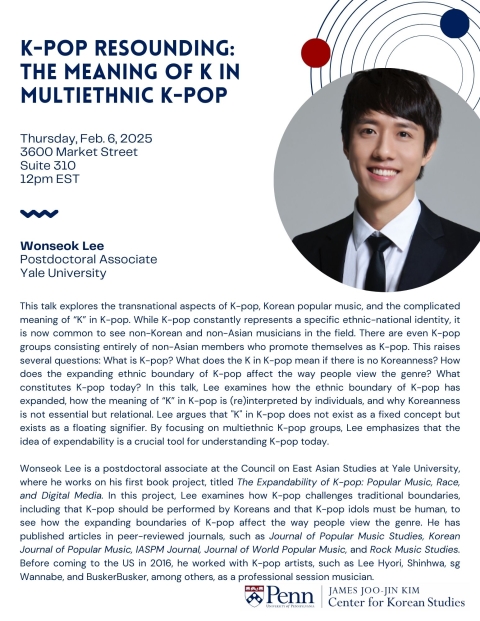
Korean Studies Colloquium
3600 Market Street, Suite 310
This talk explores the transnational aspects of K-pop, Korean popular music, and the complicated meaning of “K” in K-pop. While K-pop constantly represents a specific ethnic-national identity, it is now common to see non-Korean and non-Asian musicians in the field. There are even K-pop groups consisting entirely of non-Asian members who promote themselves as K-pop. This raises several questions: What is K-pop? What does the K in K-pop mean if there is no Koreanness? How does the expanding ethnic boundary of K-pop affect the way people view the genre? What constitutes K-pop today? In this talk, Lee examines how the ethnic boundary of K-pop has expanded, how the meaning of “K” in K-pop is (re)interpreted by individuals, and why Koreanness is not essential but relational. Lee argues that "K" in K-pop does not exist as a fixed concept but exists as a floating signifier. By focusing on multiethnic K-pop groups, Lee emphasizes that the idea of expendability is a crucial tool for understanding K-pop today.
Wonseok Lee is a postdoctoral associate at the Council on East Asian Studies at Yale University, where he works on his first book project, titled The Expandability of K-pop: Popular Music, Race, and Digital Media. In this project, Lee examines how K-pop challenges traditional boundaries, including that K-pop should be performed by Koreans and that K-pop idols must be human, to see how the expanding boundaries of K-pop affect the way people view the genre. He has published articles in peer-reviewed journals, such as Journal of Popular Music Studies, Korean Journal of Popular Music, IASPM Journal, Journal of World Popular Music, and Rock Music Studies. Before coming to the US in 2016, he worked with K-pop artists, such as Lee Hyori, Shinhwa, sg Wannabe, and BuskerBusker, among others, as a professional session musician.
 James Joo-Jin Kim Center for Korean Studies
James Joo-Jin Kim Center for Korean Studies